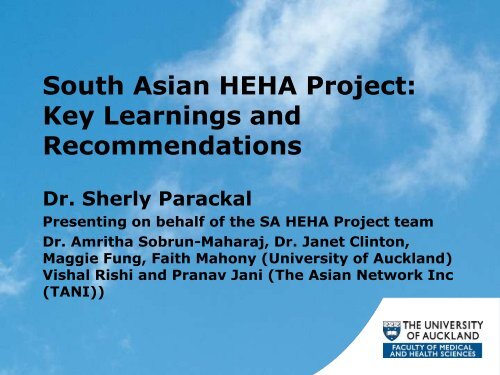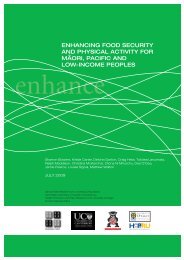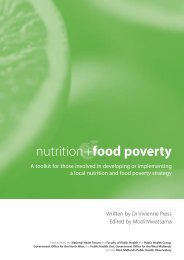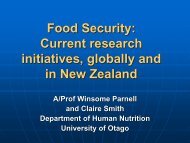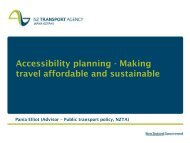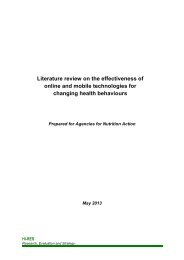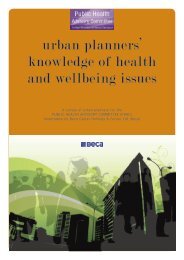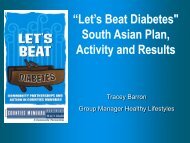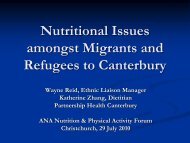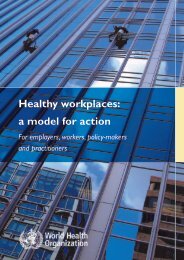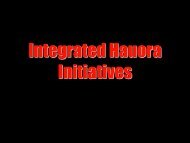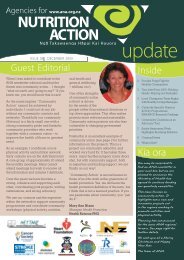South Asian HEHA Project: Key Learnings and Recommendations
South Asian HEHA Project: Key Learnings and Recommendations
South Asian HEHA Project: Key Learnings and Recommendations
Create successful ePaper yourself
Turn your PDF publications into a flip-book with our unique Google optimized e-Paper software.
<strong>South</strong> <strong>Asian</strong> <strong>HEHA</strong> <strong>Project</strong>:<br />
<strong>Key</strong> <strong>Learnings</strong> <strong>and</strong><br />
<strong>Recommendations</strong><br />
Dr. Sherly Parackal<br />
Presenting on behalf of the SA <strong>HEHA</strong> <strong>Project</strong> team<br />
Dr. Amritha Sobrun-Maharaj, Dr. Janet Clinton,<br />
Maggie Fung, Faith Mahony (University of Auckl<strong>and</strong>)<br />
Vishal Rishi <strong>and</strong> Pranav Jani (The <strong>Asian</strong> Network Inc<br />
(TANI))
<strong>Project</strong> Details<br />
• A locality based health promoting initiative<br />
funded by ADHB<br />
• Overall goal: to promote Healthy Eating <strong>and</strong><br />
Healthy Action<br />
• Short term goal focusing on “learning”<br />
• Medium term goal focusing on “change in<br />
behaviour”<br />
• Multiple methods were used to develop a<br />
culturally appropriate health promoting<br />
programme
Settings<br />
Community<br />
– Accessed through local schools<br />
– Community groups<br />
– Religious group<br />
Food outlets<br />
– Grocery stores<br />
– Restaurants <strong>and</strong> Takeaways
<strong>Project</strong> report <strong>and</strong> Training manual<br />
• Mt Roskill <strong>South</strong> <strong>Asian</strong> Healthy Eating Healthy<br />
Action <strong>Project</strong><br />
• SA <strong>HEHA</strong> <strong>Project</strong> Report<br />
• <strong>South</strong> <strong>Asian</strong> Healthy Eating Healthy Action<br />
Training Manual<br />
http://weightmanagement.hiirc.org.nz/page/290<br />
80/mt-roskill-south-asian-healthy-eatinghealthy/?section=13895&contentType=250&tab<br />
=166&__requestid=eec0ffdae0848c381845
Enablers: Providers perspective<br />
• Partnership between the University <strong>and</strong><br />
Community<br />
• Previous community linkages <strong>and</strong> networks<br />
• Presence in the community<br />
• Support from community <strong>and</strong> religious leaders<br />
• Being <strong>South</strong> <strong>Asian</strong>
Barriers: Providers perspective<br />
• Low turnout<br />
• Lack of continuity in participation<br />
• Lack of social cohesion<br />
• Heterogeneity<br />
– Language<br />
– Religious beliefs<br />
– Cultural values <strong>and</strong> attitudes towards health<br />
• Readiness to change (mindset)<br />
• The concept of volunteering is not established<br />
• Pre-occupation with settlement issues
Enablers <strong>and</strong> Barriers:<br />
participants’ perspective<br />
Enablers<br />
‣ Family <strong>and</strong> Social Support<br />
‣ Family Attitudes<br />
Barriers or Challenges<br />
‣ Attitudes towards health<br />
‣ Family Attitudes<br />
‣ Time
<strong>Key</strong> learning’s from the providers’<br />
perspective<br />
‣ Settlement issues are more pertinent <strong>and</strong><br />
important to <strong>South</strong> <strong>Asian</strong>s than health issues.<br />
‣ New migrants consider themselves as<br />
“healthy” due to “selection” for migration<br />
status
<strong>Key</strong> learning’s from the providers’<br />
perspective cont..<br />
‣ Religious affiliation may be a key factor<br />
that impacts on participation in health<br />
promotion initiatives <strong>and</strong> diet related<br />
behavioural change<br />
‣ Some religious groups may be less receptive<br />
to healthy eating messages because they<br />
prefer to follow what their religion prescribes<br />
for healthy eating
<strong>Key</strong> learning’s from the providers’<br />
perspective cont..<br />
‣ The <strong>South</strong> <strong>Asian</strong> community is heterogeneous;<br />
hence a “one size fits all” approach to health<br />
promotion does not work.<br />
‣ Sustainability of the initiative is a key<br />
component to ensure its continued positive<br />
effect in promoting health among this<br />
community.
<strong>Recommendations</strong><br />
‣ Health promotion efforts will need to include<br />
health behaviour change models to support<br />
transition from knowledge to healthy<br />
behaviour<br />
‣ Continue to develop <strong>and</strong> strengthen healthy<br />
eating <strong>and</strong> healthy action messages in the SA<br />
community
<strong>Recommendations</strong> cont..<br />
‣ Health promotion efforts should be directed<br />
towards increasing awareness among <strong>South</strong><br />
<strong>Asian</strong>s of their genetic predisposition to<br />
metabolic disorders <strong>and</strong> the fact that this risk<br />
is compounded by the process of migration<br />
‣ Health promotion initiatives may have to be<br />
tailored to meet the specific needs of <strong>South</strong><br />
<strong>Asian</strong> subgroups to be effective.


